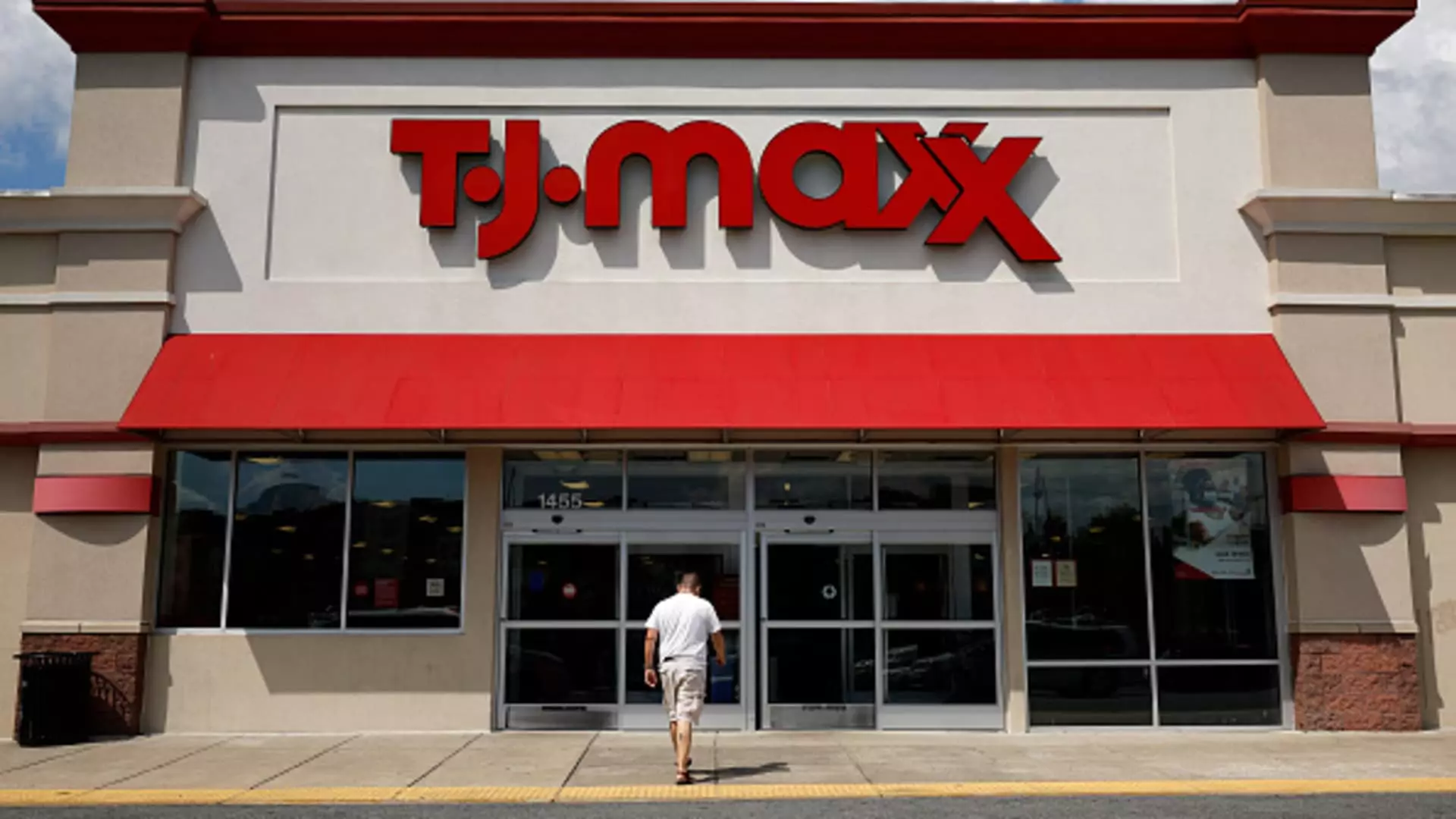It’s tempting to celebrate TJX’s latest financial report as a sign of an unshakeable retail giant weathering economic storms. Their latest earnings surpassed expectations, and they’ve boldly raised their guidance, projecting an even brighter future. But beneath this veneer of success lies a troubling reality: much of the optimism appears prematurely bolstered by strategic optimism rather than substantive strength. While the headline figures suggest resilience, they mask underlying vulnerabilities that threaten not just TJX, but the larger retail landscape.
The company’s recent performance is undeniably impressive from a surface perspective. An increase in earnings per share and revenue amid ongoing tariffs and aggressive inflationary pressures signifies a company that seems to be holding its ground. Yet, this bears the hallmarks of a narrative crafted more from hope than from sustainable growth. Elevated customer transactions, rising sales, and incrementally higher margins are good signs, but the narrative ignores the deeper economic currents that might soon expose these gains as fleeting.
In particular, the reliance on “offsetting” tariffs reveals an uncomfortable truth: the company’s apparent resilience is not rooted purely in operational excellence but in strategic optimism about the permanence of current external conditions. When a business assumes tariffs will stay in place for the foreseeable future, it takes a perilous gamble—one that could unravel dramatically if trade policies change or consumer sentiment shifts. This assumption, undeniably optimistic, might prove to be the most fragile pillar in TJX’s impressive facade.
Optimism Born of Convenience, Not Certainty
The management’s assurance that they can offset higher costs from tariffs hinges largely on the durability of current trade tensions and supply chain dynamics. But this optimistic outlook risks overlooking the volatility of geopolitical developments. Tariffs are inherently political weapons, and the assumption that current rates will remain static is naïve. History demonstrates that trade policies are inherently unpredictable, and a sudden escalation or de-escalation could severely impact TJX’s cost structure.
Further, the enthusiasm around TJX’s ability to “sidestep” adverse effects by buying excess merchandise after tariffs are applied seems more like a tactical distraction than a strategic advantage. This approach prevents immediate damage but diverts attention from a broader vulnerability: the risk of margin erosion if tariffs escalate or if the company’s supply chain is disrupted beyond what it expects. Relying on purchasing excess inventory as a buffer borders on wishful thinking, especially as other retailers might adapt similarly, intensifying competition for already strained supply chains.
The narrative also hinges on strong consumer demand. While the CEO confidently points to increased transactions, this may not be sustainable as inflation gnaws away at disposable income and economic uncertainty looms large. Consumer optimism, especially in a high-inflation environment, can evaporate quickly, and retailers like TJX may find themselves more exposed than they appear at present.
The Illusion of Market Dominance
Analysts suggest TJX’s business model provides an edge—buying clearance merchandise and quickly passing savings to consumers. While this strategy has served the company well, it risks oversimplifying the competitive landscape. Discount retailers now face rising challenges from online marketplaces, direct-to-consumer brands, and shifting consumer preferences that prize convenience and experience over bargain hunting.
The narrative that TJX can take market share from traditional department stores presumes continued consumer loyalty to off-price retailing without considering structural shifts in shopping habits. The optimism may be misplaced if consumers begin to favor online shopping over physical stores or if economic pressures lead to more cautious spending. In that scenario, TJX’s current growth and guidance could suddenly look overly optimistic, a house built on shifting sands.
Moreover, the rally in TJX shares—more than 11% this year—can be partly attributed to investor enthusiasm for resilient retail stories, but this momentum might be a double-edged sword. Overvaluation based on short-term beats risks creating a bubble that could burst once reality diverges from optimistic forecasts. If tariffs or inflation turn against retailers, the resilience portrayed in earnings reports could abruptly fade, exposing investors to losses and destabilizing the company’s market valuation.
The Center-Left’s Dilemma: Balancing Hope and Reality
From a centrist liberal perspective, there is a pressing need to scrutinize this optimism. While it’s admirable that TJX demonstrates agility and resilience, it’s equally critical to recognize the broader economic and geopolitical risks that could undermine these gains. Relying heavily on assumptions about tariffs remaining in place and consumer demand holding steady obscures inevitable vulnerabilities.
We should advocate for a more sober appraisal of retail health—one that recognizes the potential for disruption, whether from policy shifts, inflation, or changing consumer behaviors. Instead of blindly embracing the company’s positive outlook, policymakers and stakeholders must consider strategies that foster fairer trade practices, support sustainable supply chains, and mitigate the impacts of economic volatility on everyday consumers.
Ultimately, TJX’s recent success might be more of a testament to strategic spin rather than impervious strength. While the company’s figures certainly reflect a piece of the current economic landscape, they shouldn’t lull us into complacency. The retail sector, much like the economy at large, remains fragile—and overly optimistic assumptions could prove to be a costly illusion.

